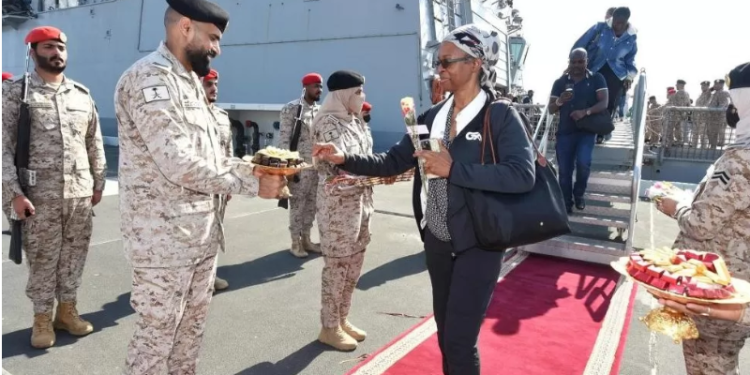President Joe Biden has stated that the US military has evacuated American diplomats and their families from Khartoum.
The operation was “quick and clean,” according to a US official.
Sunday morning, three Chinook helicopters landed near the US embassy and evacuated fewer than 100 individuals, according to reports.
The French ministry of foreign affairs announced that it was also evacuating its own citizens as well as those of other EU and allied nations.
However, both Sudan’s regular army and its adversaries, a paramilitary force known as the Rapid Support Forces (RSF), have reported that the evacuation convoy was fired upon after departing the French embassy and was forced to turn around. They placed blame for the assault on each other.
French authorities refused to comment to the BBC on whether or not an attack had occurred, but they did state that the French military based in Djibouti is involved in the operation and that the objective is to evacuate the refugees to Djibouti.
The Netherlands, Italy, Belgium, and Japan have also reported that evacuation operations have begun.
In the meantime, there are reports that internet connectivity has nearly vanished in Sudan, which could severely impede the coordination of aid for those stranded in Khartoum and other cities.
The power struggle between the regular army of Sudan and the paramilitary RSF has resulted in extensive bombardment of the capital city, resulting in the deaths of hundreds and injuries to thousands more.
US diplomatic airlift
“Today, on my orders, the United States military conducted an operation to extract US government personnel from Khartoum,” Mr. Biden stated in a statement.
During a call with reporters following the mission, Lt. Gen. Douglas Sims revealed that more than 100 US soldiers from the Navy Seals and Army Special Forces flew from Djibouti to Ethiopia and then into Sudan, where they spent less than an hour on the ground.
Although there are no indications of a formal armistice, it appears that the RSF agreed not to fire upon American helicopters during their mission.
Mr. Biden thanked Djibouti, Ethiopia, and Saudi Arabia for their “crucial” contributions to the accomplishment of the mission. In addition, he demanded an emergency ceasefire in Sudan.
The US embassy in Khartoum is currently closed, and a tweet from the embassy’s official account states that it is not secure enough to evacuate US citizens.
It was the second evacuation of foreign nationals since violence broke out in the capital of Sudan.
More than 150 individuals were evacuated by sea to the Saudi Arabian port of Jeddah on Saturday, the majority of whom were citizens of Gulf states, Egypt, Pakistan, and Canada.
The United Kingdom has stated that it is considering methods to evacuate its staff. A hotline has been established for those in need of immediate assistance, and British citizens in Sudan are implored to inform the Foreign Office of their location.
In the meantime, the Canadian government has advised its citizens in Sudan to “seek refuge in a secure location,” keep their phones charged, doors and windows closed, and “consider leaving the country if it is safe to do so.”
Many foreign students from Africa, Asia, and the Middle East, who are also stranded in Khartoum, a city of approximately 6 million people, have made desperate pleas for assistance.
Several ceasefires that had ostensibly been agreed upon by both parties were disregarded, including a three-day pause to observe the Eid al-Fitr holiday, which began on Friday.
According to the World Health Organisation, the violence has resulted in over 400 deaths and thousands of injuries. However, it is believed that the death toll is significantly greater as people struggle to reach hospitals.
Citizens of the United Kingdom left stranded and frustrated
On Saturday, British Prime Minister Rishi Sunak presided over an emergency government Cobra meeting to assess the Sudan crisis, and further discussions are anticipated on Sunday.
Foreign Secretary James Cleverly is returning to London after cutting short a tour of the Pacific.
Some British citizens stranded in Sudan have expressed frustration and concern over the lack of an evacuation.
Iman Abu Garga, a British tourist in Khartoum, stated that she had registered herself and her two children as instructed, “and since then – nothing”.
“We have no knowledge of timescale or timeline. We have no idea what its appearance will be. Will we be airlifted out of the Khartoum airport? Will we have to travel by road? She complained that the complete lack of human interaction was excruciatingly aggravating.
In addition to Khartoum, the western region of Darfur, where the RSF first emerged, has been severely impacted by the conflict.
The United Nations has warned that up to 20,000 people, mostly women and children, have abandoned Darfur for safety in neighbouring Chad.














































